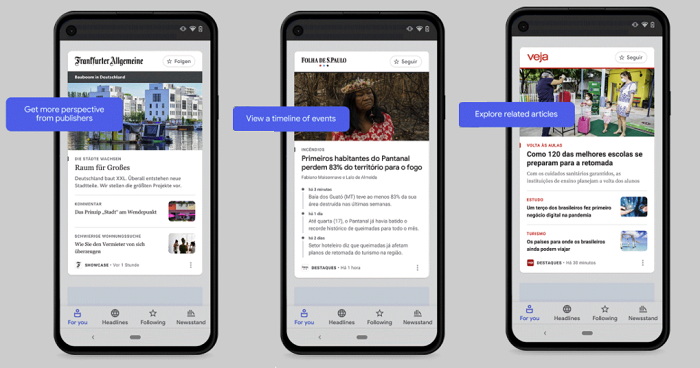SOCIAL
Google Announces $1 Billion Partnership Program with News Publishers in Europe

Amid ongoing questions about how digital platforms profit from news and publisher content, and how they subsequently share the benefits of such with the original creators, Google has this week announced a new, $1 billion partnership with European news publishers as it seeks to establish improved connection, and facilitate the evolution of the news publishing sector.

As explained by Google:
“This financial commitment – our biggest to date – will pay publishers to create and curate high-quality content for a different kind of online news experience. Google News Showcase is a new product that will benefit both publishers and readers: It features the editorial curation of award-winning newsrooms to give readers more insight on the stories that matter, and in the process, helps publishers develop deeper relationships with their audiences.”
It sounds very similar to Facebook’s dedicated News tab, which it’s in the process of rolling out, and which also enables approved publishers to essentially curate and manage their content on the platform, helping improve connection with audiences, while also establishing a more official, vetted stream of official news, which could help reduce the spread of misinformation.
But while Facebook has focused its announcements on news content quality and original reporting, Google’s new program seems more focused on paying publishers – which makes sense, given the various battles the search giant is facing in regards to the way in which it uses news content.
The Australian government, for example, is currently looking to implement new legislation which would essentially force both Facebook and Google to share part of their revenue with local news publishers for the use of their content on their platforms. Both Google and Facebook have rejected the proposal, and have threatened to stop using publisher content completely, if the new measures are approved.
And they’re right. The Australian proposal is based on the flawed principle that Google and Facebook need the content created by local news publishers to survive, which they don’t, and as a result, the final outcome of the push, if the Government does choose to go ahead with it, will see local publishers lose out on web traffic and revenue as a result of the two giants revising their processes in line with the rules.
That’s the opposite outcome to what the Government is seeking to achieve, but the basis for the push, which has also been enacted in different ways in both France and Spain, is really that Facebook and Google are making a lot of money, while local publishers are struggling.
Facebook and Google use their content, so they should share, right?
Well, kind of – as Google explains:
“Google Search and Google News help news publishers by sending large amounts of traffic for free to their sites. In Europe alone, people click on the news content Google links to more than eight billion times a month—that means we drive 3,000 clicks per second to publishers’ own websites. For larger news publishers, a study by Deloitte put the value of each click between 4-6 euro cents, mostly generated through advertising and subscriptions.”
So Google’s saying that it already does provide financial benefit to news publishers, and its working to improve those benefits through programs like this new, billion-dollar commitment, as well as the Google News Initiative and other projects.
“It’s not true to say we don’t pay for news or drive value for the industry. As mentioned above, Google links to news, and helps drive millions of readers to publishers’ sites and apps – rather than carrying news articles ourselves. That creates a huge opportunity for publishers to turn those readers into loyal subscribers or show ads.”
Essentially, Google’s counter-argument is that the news industry needs to evolve its business model with modern consumption behaviors, which is the real solution, not simply paying arbitrary percentages based on flawed modeling.
But that will take time, and significant industry shifts, while it also leaves publishers at the mercy of Facebook and Google’s systems. That’s not an ideal scenario, but the basis of Google’s stance makes logical sense – and either way, Google has shown no sign of shifting in its approach to such in the face of previous, similar challenges.
Better then, maybe, for publishers to work with it – and new initiatives like this could provide a new way for publishers to maximize revenue opportunities, while also maintaining more control over audience connection, enabling them to build on their own terms and platforms.
It’s a very complex area, but Google’s new initiative could help provide another way forward for the industry.
Google says that it’s signed partnerships for its News Showcase with nearly 200 leading publications across Germany, Brazil, Argentina, Canada, the U.K. and Australia. News Showcase will begin rolling out to Google News users in Brazil and Germany from today, and will expand to other countries in the coming months “where local frameworks support these partnerships”.
SOCIAL
Snapchat Explores New Messaging Retention Feature: A Game-Changer or Risky Move?

In a recent announcement, Snapchat revealed a groundbreaking update that challenges its traditional design ethos. The platform is experimenting with an option that allows users to defy the 24-hour auto-delete rule, a feature synonymous with Snapchat’s ephemeral messaging model.
The proposed change aims to introduce a “Never delete” option in messaging retention settings, aligning Snapchat more closely with conventional messaging apps. While this move may blur Snapchat’s distinctive selling point, Snap appears convinced of its necessity.
According to Snap, the decision stems from user feedback and a commitment to innovation based on user needs. The company aims to provide greater flexibility and control over conversations, catering to the preferences of its community.
Currently undergoing trials in select markets, the new feature empowers users to adjust retention settings on a conversation-by-conversation basis. Flexibility remains paramount, with participants able to modify settings within chats and receive in-chat notifications to ensure transparency.
Snapchat underscores that the default auto-delete feature will persist, reinforcing its design philosophy centered on ephemerality. However, with the app gaining traction as a primary messaging platform, the option offers users a means to preserve longer chat histories.
The update marks a pivotal moment for Snapchat, renowned for its disappearing message premise, especially popular among younger demographics. Retaining this focus has been pivotal to Snapchat’s identity, but the shift suggests a broader strategy aimed at diversifying its user base.
This strategy may appeal particularly to older demographics, potentially extending Snapchat’s relevance as users age. By emulating features of conventional messaging platforms, Snapchat seeks to enhance its appeal and broaden its reach.
Yet, the introduction of message retention poses questions about Snapchat’s uniqueness. While addressing user demands, the risk of diluting Snapchat’s distinctiveness looms large.
As Snapchat ventures into uncharted territory, the outcome of this experiment remains uncertain. Will message retention propel Snapchat to new heights, or will it compromise the platform’s uniqueness?
Only time will tell.
SOCIAL
Catering to specific audience boosts your business, says accountant turned coach

While it is tempting to try to appeal to a broad audience, the founder of alcohol-free coaching service Just the Tonic, Sandra Parker, believes the best thing you can do for your business is focus on your niche. Here’s how she did just that.
When running a business, reaching out to as many clients as possible can be tempting. But it also risks making your marketing “too generic,” warns Sandra Parker, the founder of Just The Tonic Coaching.
“From the very start of my business, I knew exactly who I could help and who I couldn’t,” Parker told My Biggest Lessons.
Parker struggled with alcohol dependence as a young professional. Today, her business targets high-achieving individuals who face challenges similar to those she had early in her career.
“I understand their frustrations, I understand their fears, and I understand their coping mechanisms and the stories they’re telling themselves,” Parker said. “Because of that, I’m able to market very effectively, to speak in a language that they understand, and am able to reach them.”Â
“I believe that it’s really important that you know exactly who your customer or your client is, and you target them, and you resist the temptation to make your marketing too generic to try and reach everyone,” she explained.
“If you speak specifically to your target clients, you will reach them, and I believe that’s the way that you’re going to be more successful.
Watch the video for more of Sandra Parker’s biggest lessons.
SOCIAL
Instagram Tests Live-Stream Games to Enhance Engagement

Instagram’s testing out some new options to help spice up your live-streams in the app, with some live broadcasters now able to select a game that they can play with viewers in-stream.
As you can see in these example screens, posted by Ahmed Ghanem, some creators now have the option to play either “This or That”, a question and answer prompt that you can share with your viewers, or “Trivia”, to generate more engagement within your IG live-streams.
That could be a simple way to spark more conversation and interaction, which could then lead into further engagement opportunities from your live audience.
Meta’s been exploring more ways to make live-streaming a bigger consideration for IG creators, with a view to live-streams potentially catching on with more users.
That includes the gradual expansion of its “Stars” live-stream donation program, giving more creators in more regions a means to accept donations from live-stream viewers, while back in December, Instagram also added some new options to make it easier to go live using third-party tools via desktop PCs.
Live streaming has been a major shift in China, where shopping live-streams, in particular, have led to massive opportunities for streaming platforms. They haven’t caught on in the same way in Western regions, but as TikTok and YouTube look to push live-stream adoption, there is still a chance that they will become a much bigger element in future.
Which is why IG is also trying to stay in touch, and add more ways for its creators to engage via streams. Live-stream games is another element within this, which could make this a better community-building, and potentially sales-driving option.
We’ve asked Instagram for more information on this test, and we’ll update this post if/when we hear back.
-

 MARKETING7 days ago
MARKETING7 days agoThe key to correcting the C-suite trust deficit
-

 MARKETING6 days ago
MARKETING6 days agoA Recap of Everything Marketers & Advertisers Need to Know
-

 MARKETING4 days ago
MARKETING4 days agoHow To Protect Your People and Brand
-

 PPC4 days ago
PPC4 days agoHow the TikTok Algorithm Works in 2024 (+9 Ways to Go Viral)
-

 SEARCHENGINES5 days ago
SEARCHENGINES5 days agoGoogle Started Enforcing The Site Reputation Abuse Policy
-

 SEO7 days ago
SEO7 days ago128 Top SEO Tools That Are 100% Free
-

 SEO3 days ago
SEO3 days agoHow to Use Keywords for SEO: The Complete Beginner’s Guide
-

 PPC5 days ago
PPC5 days agoHow to Craft Compelling Google Ads for eCommerce



